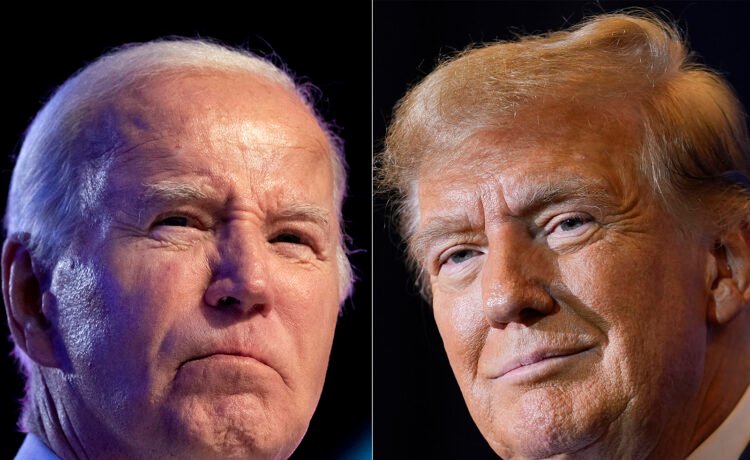(RNS) — On Election Day in November 2022, Pastor Charlie Berthoud of Covenant Presbyterian Church in Madison, Wisconsin, sat at a table outside the church’s polling place and handed out treats and encouragement.
“Anyone want a nonpartisan cookie?” he recalls asking neighbors who came by to vote.
“We want to thank people for taking part in the democratic process,” said Berthoud, who believes voting is both a civic duty and an act of faith. That idea, he said, is enshrined in the constitution of the Presbyterian Church (U.S.A.), which Covenant belongs to.
“Voting is in our job description,” said Berthoud, who hopes to hand out more cookies this November.
This fall, the outcome of the presidential election may be determined by how church members like those at Covenant do that job.
The difference-makers
While evangelicals and Christian nationalists have made the most of the God and country political headlines in recent years, experts say they aren’t as numerous or influential as other faith groups in the swing states — such as Wisconsin — where the presidential election will likely be decided.
For example, about half of voters in Wisconsin identify as mainline Protestants or Catholics, said Craig Gilbert, the former Washington bureau chief of the Milwaukee Journal Sentinel and a fellow at the Marquette University Law School’s Lubar Center for Public Policy Research and Civic Education. The “nones” — those who claim no religion — make up another quarter. White evangelicals (16%) and other faiths make up the rest.
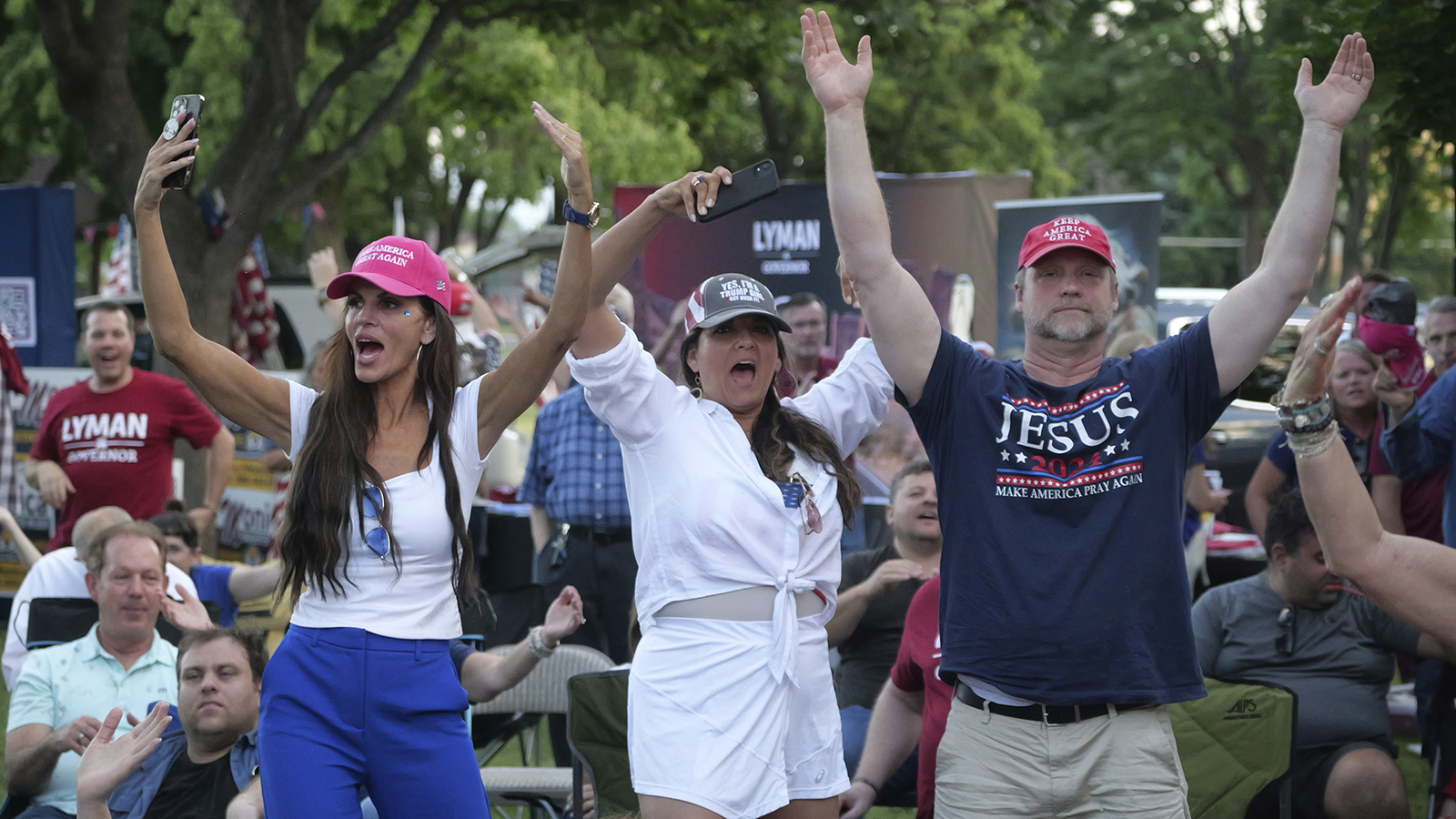
Republicans attend a rally for Trump-backed U.S. Senate candidate Trent Staggs and others on June 14, 2024, in Orem, Utah. (AP Photo/Rick Bowmer)
Gilbert said he and a colleague looked at polling from 2020 and compared it with more recent polls. Their study showed that both candidates are seen less favorably than they were in 2020 — though former President Donald Trump has become more popular with born-again voters while President Joe Biden has become more popular with nones.
Predicting what will happen this fall is tricky, he said.
“You can talk yourself into reasons why neither guy can win,” he said. “They are both more unpopular than they were the last time they met each other.”
Nationwide, some faith groups will be courted by campaigns as part of turnout operations, such as nones and Black Protestants, who tend to back Democrats, and white evangelicals, who overwhelmingly vote for Republicans.
But the gap between the two parties is closer among Catholics and mainliners, making them targets for persuasion — even as both groups have inched closer to Republicans.
“You can sort of think of white, nonevangelical Protestants and white Catholics as the center of the political spectrum,” said Greg Smith, associate director of research at Pew Research Center.
Here’s a look at how the faith vote is playing out in these battleground states.
Pennsylvania
While Biden has Pennsylvania roots and is a regular Mass-attending Catholic, he may not find enthusiastic support in his home state among those who share his faith. Both he and Trump are unpopular with voters, said Christopher Borick, professor of political science and director of the Muhlenberg College Institute of Public Opinion.
“I think the major takeaway is that indeed there is lots of dissatisfaction,” said Borick, referring to the results of an April 2024 Pennsylvania survey about the presidential election.
In that poll, Trump led among Catholics by 45% to 41% for Biden. Among Protestants overall, Trump got 56% of support, while Biden got 33%. Folks from other major religions and atheists/agnostics favor Biden over Trump.
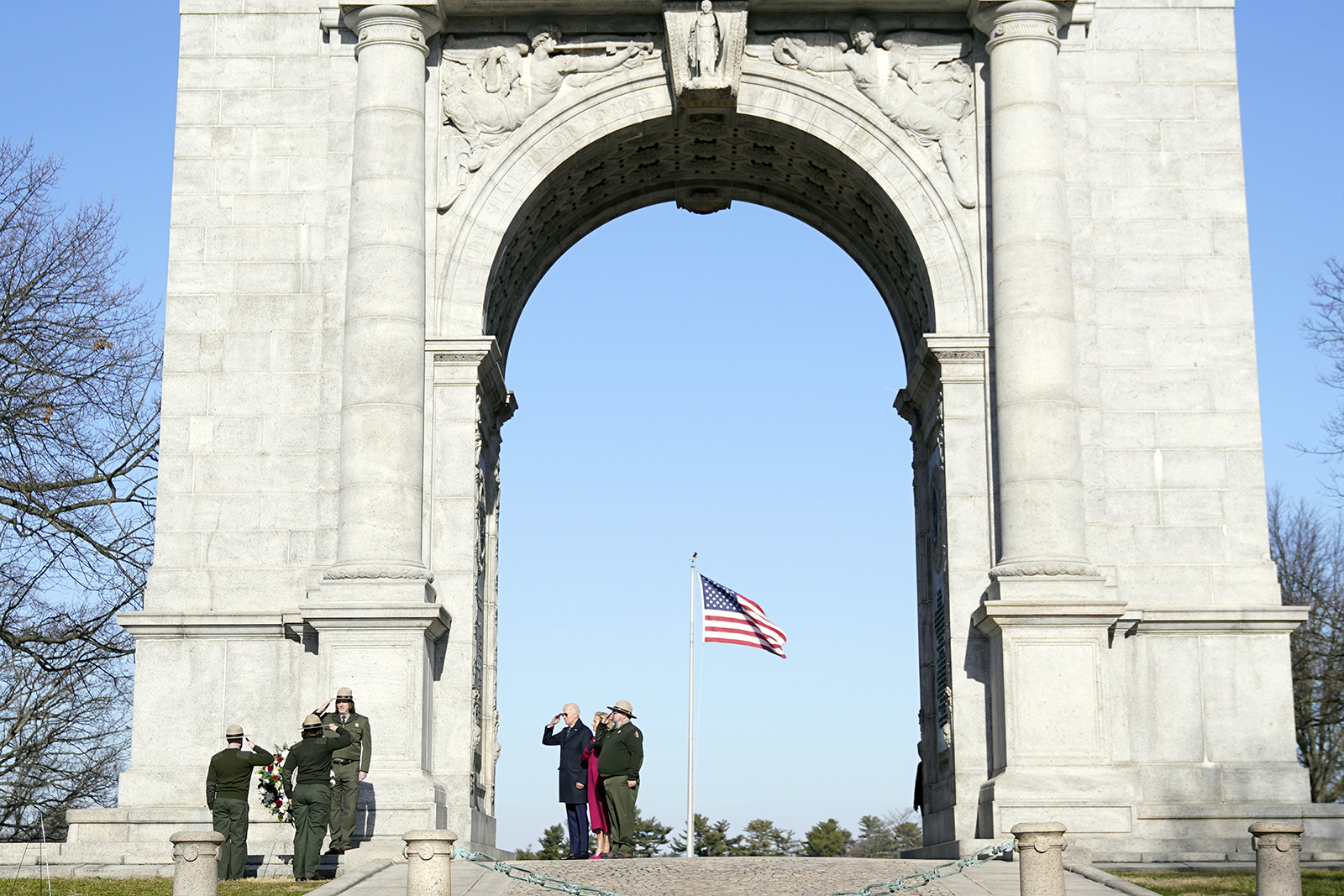
President Joe Biden and first lady Jill Biden participate in a memorial wreath ceremony at the National Memorial Arch at Valley Forge National Historic Park in Valley Forge, Pa., Jan. 5, 2024. (AP Photo/Stephanie Scarbrough)
“For a practicing Catholic and someone that loves these Pennsylvania roots to not be winning that group is challenging,” said Borick. “But that’s the nature of the Catholic vote.”
Michael Coulter, professor of political science and humanities at Pennsylvania’s Grove City College, said Pennsylvania — where closely contested matches are increasingly common — will likely come down to motivating swing voters, especially among mainliners and Catholics.
“These might be people who might not be switching from Trump to Biden or from Biden to Trump — but they might be switching from nonvoter to voter,” he said. “And that becomes a very important thing.”
Georgia
Religion has long been a major political player in Georgia, which remains one of the most religious states in the country: More than half the population attends religious service at least a few times a year, according to the Public Religion Research Institute.
Georgia reentered the swing state discussion in 2020, when the Peach State — which hadn’t backed a Democrat for the presidency since 1992 — went for Biden. Voters also elected two Democratic senators, one of whom is the Rev. Raphael Warnock, a prominent Black Baptist pastor. Experts frequently point to two groups when assessing the impact of religion on those elections: white evangelicals and Black Protestants.
Trump, for his part, aggressively courted evangelicals in 2020, enlisting Georgia-based pastors as faith advisers and hosting faith-themed “Praise, Prayer and Patriotism” events in the state.
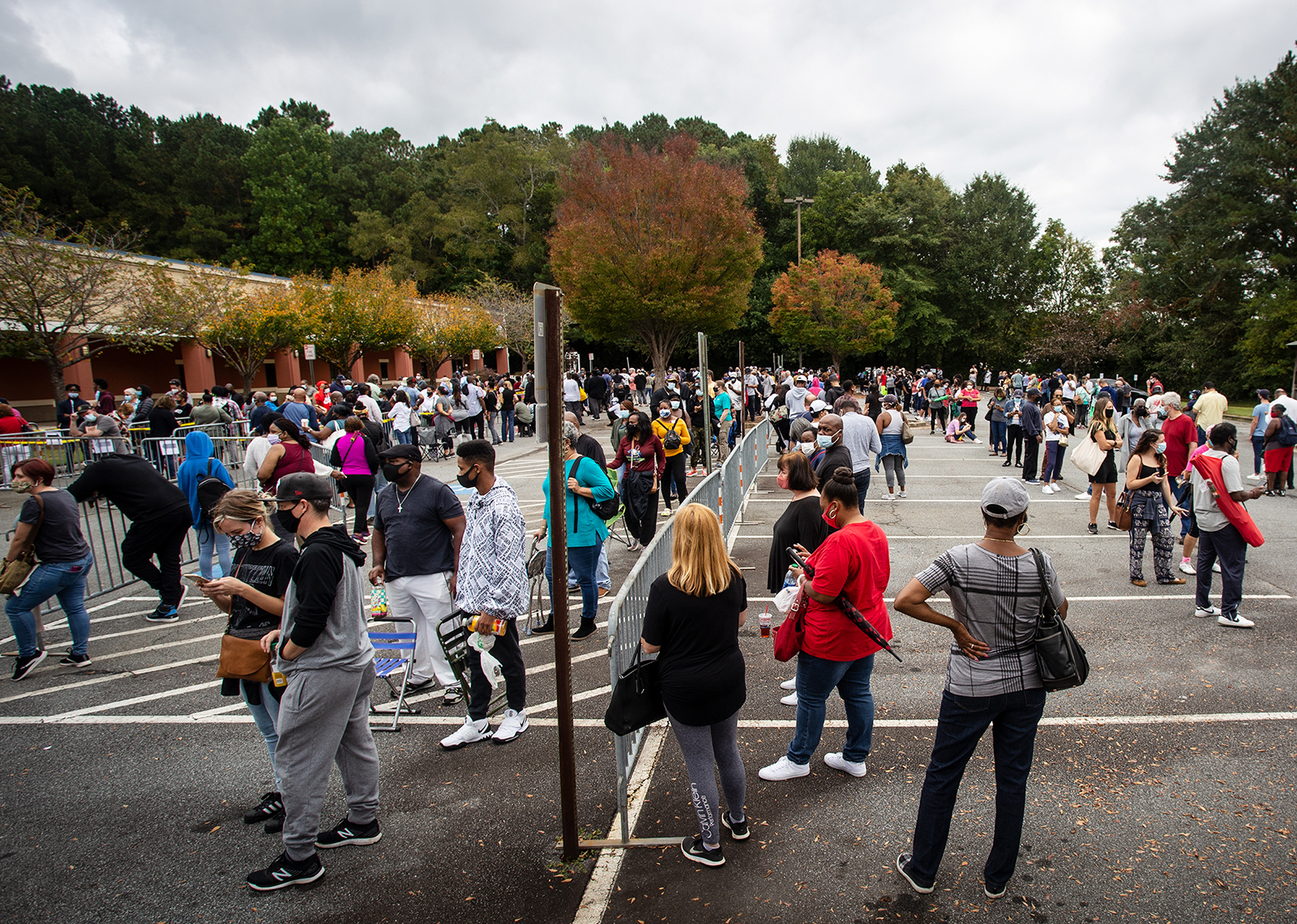
Hundreds of people wait in line for early voting in Marietta, Ga., on Oct. 12, 2020. (AP Photo/Ron Harris, File)
“There’s a mingling on the evangelical side of religion and politics that certainly benefits Donald Trump and benefits other Republicans up and down the ballot,” said Charles Bullock, a political science professor at the University of Georgia.
Conversely, Bullock noted Democratic candidates “regularly attend Black church services” seeking support, and sometimes — much like Republican candidates at white evangelical churches — even speak from pulpits.
In both cases, politicians are engaging in more of a “mobilizing effort than a conversion effort,” he explained. It can make or break a campaign: In 2022, Republican former football star Herschel Walker narrowly lost his U.S. Senate bid to Warnock in a campaign where both candidates leaned heavily on religious rhetoric. But Walker got 81% of the evangelical vote, a drop-off from Trump and Georgia Gov. Brian Kemp.
“Had he hit probably 82% of the white evangelical vote, we would have Senator Herschel Walker right now in D.C.,” said Bullock.
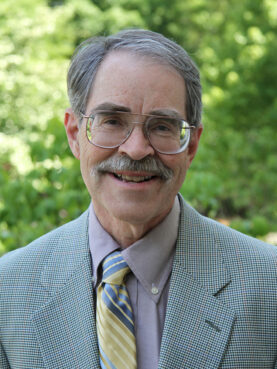
Charles Bullock. (Photo courtesy of UGA)
But religion’s dominance over politics in the South may be waning. According to Bullock, younger Southerners are abandoning rural homesteads for better job prospects in nearby cities, with many breaking off ties to their home churches. Younger, less religious Americans from outside the state have also flocked to cities such as Atlanta.
“Overall, the people moving into these growth states are more Democratic than the existing population is,” he said.
When it comes to persuasion, both parties are fighting over a demographic that is believed to be less religious and has shown a tendency to shift political allegiances: white, college-educated voters. Bullock argued Trump has been a deciding factor for this group in the past, and not in a way that favors the former president.
“You’ve got these white, college-educated voters who are still essentially Republicans, but they just can’t bring themselves to vote for Donald Trump or someone like him,” Bullock said.
Arizona and Nevada
Religion was once an afterthought in Arizona politics, but locals say it has increasingly become a major factor — or at least a rallying cry.
In 2020, Dream City Church, a megachurch in Phoenix, hosted a Trump campaign event. In the years since, the church — along with several others — has forged a relationship with the activist group Turning Point USA and began openly advocating for forms of Christian nationalism from the pulpit. Politicians, too, have begun engaging more aggressively with evangelicals, such as failed gubernatorial candidate Kari Lake.
When Trump once again spoke at Dream City Church during a rally earlier this month, the crowds treated it as a triumphant return.
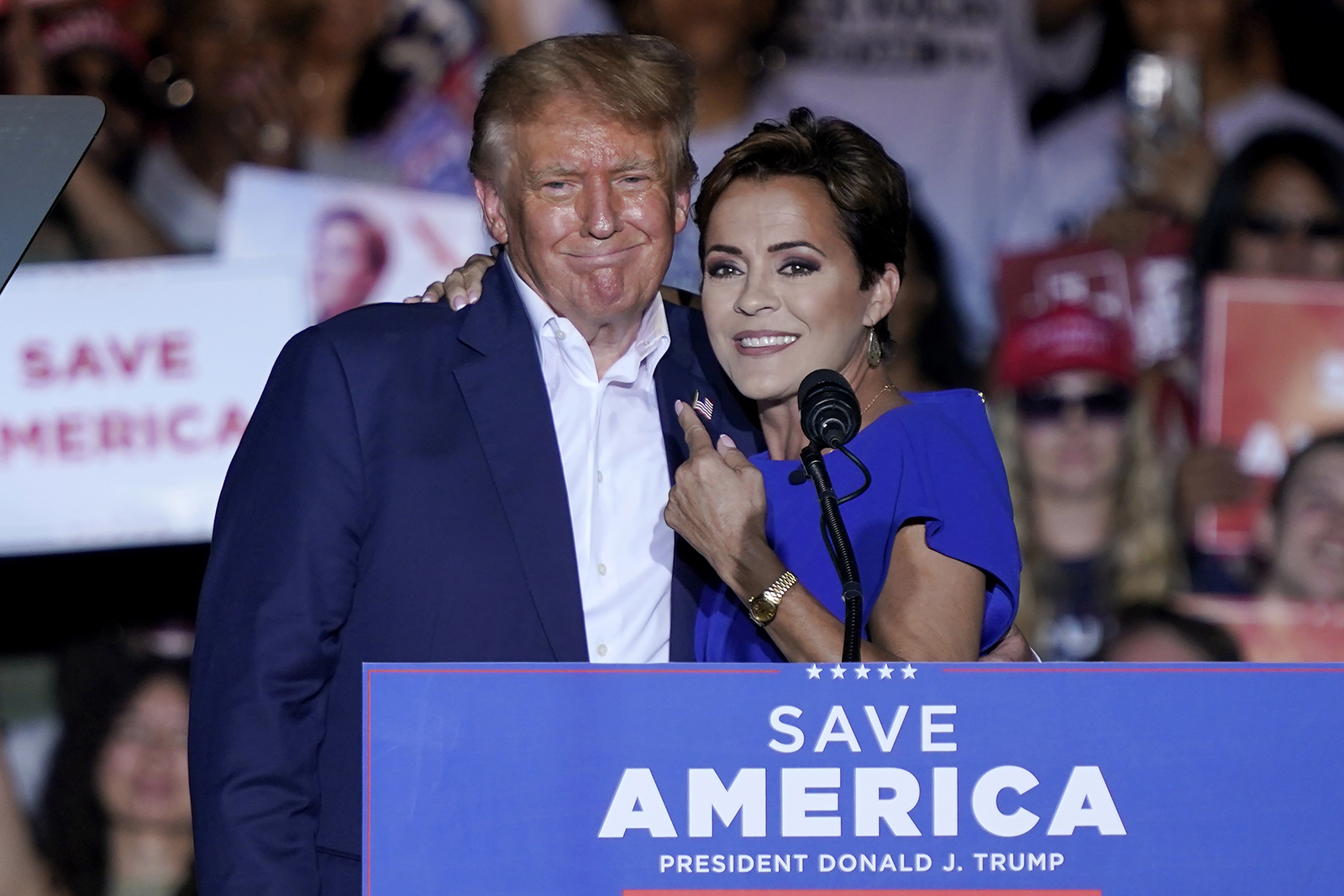
Arizona Republican gubernatorial candidate Kari Lake, right, speaks as former President Donald Trump listens during a rally, Oct. 9, 2022, in Mesa, Ariz. (AP Photo/Matt York, File)
“It’s strange as an Arizonan, because we’re just not used to it,” said the Rev. Caleb Campbell, a pastor at Desert Springs Bible Church who has launched an effort to combat what he says is a rise in Christian nationalism.
Yet for all the energy that has gone into religious outreach by conservatives in the state, it has yet to produce major results at the national level.
“The people who’ve been doing it are not winning,” Campbell said, noting Trump’s 2020 loss as well as Lake’s failed bid despite hard-charging religious rhetoric.
According to Thomas Volgy, professor of political science at the University of Arizona, national-level campaigns appear to be struggling with Arizona’s unusual electorate.
“The key is not Republicans or Democrats, but independents,” he said. “They make the largest grouping of people, and they look a lot more on social issues — and in terms of their religious preferences — (like) Democrats rather than Republicans.”
Jon Ralston, a veteran journalist and expert on Nevada politics, said his state has also seen a surge in independent voter registration due to a new law that automatically adds people to voter rolls when they interact with the Department of Motor Vehicles. Like in Arizona, Trump has made campaign stops at churches in the state, but Ralston was skeptical that courting religious votes alone could secure a victory for either candidate.
“It’s a very mercurial electorate, and even more so now, because there’s been a huge upsurge in independent registration,” Ralston said.
Both Nevada and Arizona have also seen an influx of new residents moving in from blue states such as California. In Arizona’s case, Volgy said, the shift has “likely made the state more liberal” while also diminishing the voting power of religious groups such as members of The Church of Jesus Christ of Latter-day Saints — a traditionally Republican-leaning group which polls nonetheless show have long been skeptical of Trump.
Meanwhile, 1 in 4 Arizona voters are expected to be Latino this year. It’s a demographic analysts say is up for grabs: In a June 2023 Axios-Ipsos poll that surveyed Latino adults nationwide, a plurality (32%) said “neither” party represents them. And while Arizona’s Hispanic population leans heavily Catholic (along with pockets of evangelicals), their voting priorities often diverge from the views of church hierarchy on issues such as abortion, making Election Day outcomes hard to predict.
Michigan
Michigan, a state that had moderately supported Democratic presidential candidates since 1992, was an unexpected win in Trump’s first candidacy and a real blow to his second when he lost it. The Rev. Ralph Rebandt, founder of Michigan Lighthouse Ministries, said he’s determined to get his fellow Michigan evangelicals out to vote this fall, in hopes of returning the state to the Republican column in the presidential race. A former pastor turned political activist, Rebandt said that many Michigan evangelicals didn’t vote in 2022, when a constitutional amendment protecting abortion rights was on the ballot.
The measure, which Rebandt’s group opposed, passed.
“The church did not show up,” he said.
Rebandt — who resigned from the church he’d led for three decades in order to run for governor in 2022 — has traveled the state in recent months, hoping to boost turnout for the 2024 presidential election. He gives presentations about Christian influence in American history as well as telling churchgoers they have a duty to vote.
“It’s funny,” he said. “The church has been told to stay out of politics, but it’s politics that bring the church together.”
He added: “This is good versus evil.”
Corwin Smidt, a senior fellow at Calvin University’s Paul Henry Institute and longtime observer of Michigan politics, said the state’s religious diversity plays a role in its politics. Along with Catholics, mainliners and evangelicals, the state has a sizable Muslim and Black Protestant population.
It’s not clear how those groups will vote. Christians who lean evangelical, in places such as Grand Rapids and other parts of western Michigan, may not be as enthusiastic about Trump as they are in the Bible Belt or other Republican strongholds. The state’s Muslim voters, who have supported past Democratic candidates, may be less likely to vote for Biden because of the war in Gaza.
Turnout among Black voters, particularly in Wayne County, which includes Detroit, may prove key. Black Protestants have been staunch supporters of Democratic presidential candidates in the past, and a nationwide Pew Research poll from earlier this year found that 77% support Biden in the 2024 presidential race. Smidt pointed out that in 2016, Trump won Michigan largely because of a big drop-off in African American votes.
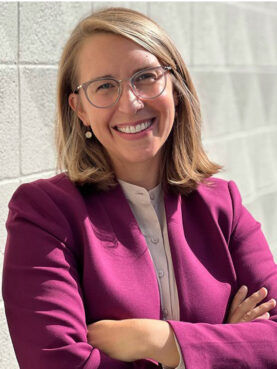
U.S. Rep. Hillary J. Scholten. (Courtesy photo)
Engaging with religion can be a balancing act. U.S. Rep. Hillary J. Scholten, who represents Michigan’s Third District, is known for talking about faith and politics everywhere she goes — well, almost everywhere.
“For me, I leave my politics at the door whenever I go to church,” she said.
Scholten, a Calvin College graduate, grew up in a Dutch Reformed version of Christianity that straddles the line between evangelical and mainline versions. She described the people in her district as both independent and deeply spiritual. They don’t want government intrusion in matters that are personal, like in vitro fertilization, she said. Instead, she said, they want to be free to choose what they believe is the right thing to do. They also want faith to play a role in public life.
“I have seen just an overwhelming number of people who have been drawn to our campaign, because I have not been afraid about talking about my faith — and frankly being unapologetic about being a person of deep Christian faith,” she said.
Wisconsin
Back in Wisconsin, Berthoud said that during the election season, he tries to keep the focus on the common good and to help people listen to different of points of view. Berthoud, who described himself as a back-to-basics pastor, said he also tries to focus on Christian virtues such as kindness, honesty and loving your neighbor. While the church encourages voting, Berthoud does not endorse candidates and tries to walk a fine line of defending democracy without demonizing others.
“I’m not going to tell people to paint the house orange or blue,” he said. “But if someone’s threatening to burn down the house, then I feel like I need to say something.”
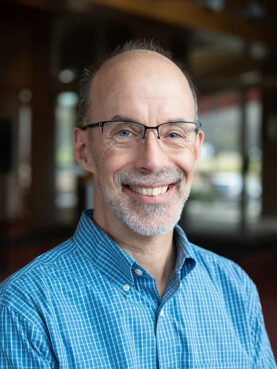
Pastor Charlie Berthoud. (Courtesy photo)
Kris Androsky, pastor of Community United Methodist Church in Elm Grove, Wisconsin, said the polarization of American culture and the upcoming election make pastoring in an election year difficult.
Her church, located in suburban Waukesha County, a Republican stronghold that Trump won by nearly 60,000 votes in 2020, was politically and theologically diverse when she arrived six years ago. Today the church is less diverse politically as people have begun to self-select in or out along political divides. COVID-19 split folks apart. The 2020 election and the polarization of the last four years have just deepened the divides.
“Pre-COVID and pre-Trump, we could think about our neighbors in a nice, clean, nonpersonal way,” she said. “Of course we love everybody.”
Now, she said, people are much more aware of who their political enemies are — and who their neighbors voted for. That makes the reality of loving your neighbors, and your enemies, much harder.
Androsky believes faith should play a role in how people vote on issues. The problem comes when outside politics divide a congregation and make it hard for people with different views to worship together. As the election approaches, things will become increasingly complicated.
“In election years, everything gets a little bit wonky and wild in general,” she said. “I suspect that that will be true for church leadership as well.”

